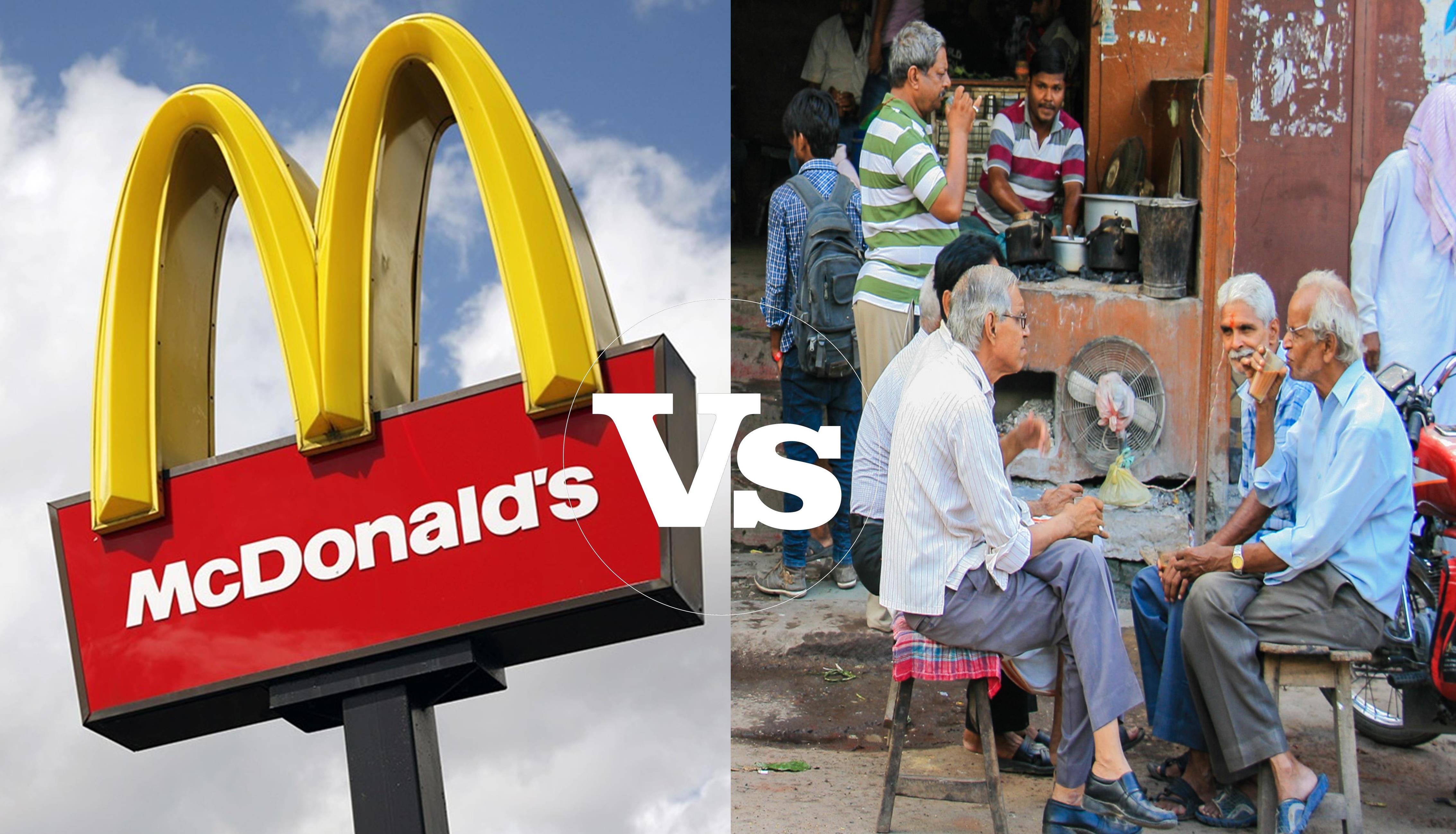As many of the popular McDonald’s outlets shut down in the city, we rediscover the once vibrant local food stall at the corner of the street- and revisit a time where people ‘connected’ without Social Networks.
Dheeraj Singh | THE NEW LEAM
There are many articles which suggest that 43 out of the 55 outlets of McDonald’s food chain across the capital city of Delhi are shutting down. From over the last 20 Years, these global food outlets have attracted a large number of people, mostly youngsters. McDonald’s seems to have emerged as the most easily accessible outlet for a quick meal at reasonable prices all over India. In the last few decades the popularity of global food chains has increased considerably and this receptive ambiance has brought about the rapid proliferation of global food chains across the country and the market that it offers is cherished as one of the most reliable and profit making for business makers over the globe.
After the onset of the neo-liberal era, India saw the unprecedented growth of the global market- inviting several multinational businesses in all possible sectors from food chains, to clothing lines, to cars and mobile brands. Their presence had an immensely shattering impact on the fate of local businesses and thus gradually lead to a complete decadence of indigenous industry in most cases.

If one were to consider only the impact on food/catering services one would discover that the market is filled with global outlets and only a limited number of indigenous food outlets are available.
They have and had no attraction among the aspiring youth who look at the consumption of international brands and lifestyles as indicators of social mobility. Yes, the reasons often given to have a leniency towards these international brands are hygiene and quality and there is no doubt that in many cases this holds true. We find it to be almost absolutely certain that we would fall sick or become unhealthy by eating from the local/road side vendors. We always find foreign/international food outlets as more reliable options when choosing a place to dine. Yes it cannot be altogether denied that in the last twenty years, both the quality and hygiene standards of local food has suffered a lot and needless to add this has further allowed the decline of their business and the overall popularity and acceptability at least among the middle to the higher classes of India’s urban population.While the truth of negligence and inadequate standards cannot be overlooked but does this mean we shall altogether allow our own indigenous food outlets to perish into inexistence? Are global food chains our final salvation?
We must realize that faced with international competition and aggressive global markets small and indigenous businesses across the country received a tremendous jolt and what added to their misery was the unavailability of any support system from the state in terms of protection nets and safeguards. What thus happened was that the meta-narrative of the global market killed the indigenous one and ironically we did little to change it. This meant that with the decline of indigenous industry the multinational firms took over and the economy quickly and changed both its colors and priorities.
In India, food and street side outlets are not just about consumption but rather they play a very important role in the development of social harmony and communication. I recall that only about fifteen years ago the local shops/tea stalls were the most vibrant sites with the ongoing flow of people. Many came from faraway places to eat specific popular food or even spend a light time with friends and family. This social character of local eating/tea joints added to the creation of a shared community space where generations met, talked politics, cricket, weather and local gossip and even shared laughter and tears! Yes, almost like in Plato’s Republic when the masses met talked, discussed, disagreed and debated and cherished the democratic and dialogic place that allowed the flow of ideas indiscriminately.
Historically too, these shared community spaces have played an important role. Many local historiographies and detailed studies have revealed how even during the national movement in India these spaces helped in the mobilization of the commoners and generated the much needed spaces for the development of the nationalist consciousness by allowing the scope for the exchange of ideas and debates.
Not only this, these local outlets used to provide employment to a large number of people. Many of whom lacked literacy or formal skills to engage elsewhere. This source of employment that sustained many without a demand for certificates and skills, degrees or training is on the quick decline.
The city ambience with glamorous and high-end food outlets is indeed strikingly different from its indigenous counterparts.
The ambience at modern cafeterias and restaurants have all the modern amenities be it air conditioners or free Wifi and menus that span continents but do not match up to the indigenous local outlets that though humble in terms of infrastructure and glamour successfully inspired the culture of free discussion and passionate debates among its ordinary customers.
The sanitized ambience in modern eateries, the codified and armored body languages of the emergent middle class customers and the obsessive and indulgent use of smartphones and wifi have all collectively lead to the decline of the public space as an opportunity for sustained democratic dialogue. Thus while brands suggest that ‘A lot can happen over a cup of Coffee’ ironically the ambience that would have allowed that is gradually disappearing.
Thus while many of the popular chain McDonald’s outlets are being shutdown it is time we searched for the long lost local food joint that once inspired many meaningful conversations over endless cups of extra-sweet garam chai!
The New Leam has no external source of funding. For retaining its uniqueness, its high quality, its distinctive philosophy we wish to reduce the degree of dependence on corporate funding. We believe that if individuals like you come forward and SUPPORT THIS ENDEAVOR can make the magazine self-reliant in a very innovative way.














